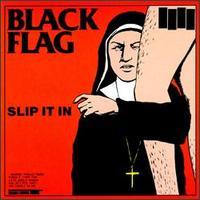In most ways, American hardcore was all about breaking down walls and slaying sacred cows. That being said, most of the bands were surprisingly puritanical when it came to the subject of sex. With Slip It In, Black Flag got more risque than most hair metal bands dared in 1984. The distinctive Raymond Pettibon artwork pushed the boundary even further. The nun on the cover made it sacrilegious as well as salacious. They were also making songs longer than the typical three minute radio friendly ditties playing on the FM dial. It was certainly a far cry from their two minute blasts of rage that helped define the punk and hardcore genres. Slip It In has remained among the more underappreciated Black Flag albums.
The six plus minute title track led things off and leaved little to the imagination. It was provocative and overtly sexual, but that’s the point. Black Flag was exploring new ways to push boundaries. They were challenging misogyny with a song that at first glance seemed misogynistic. “Slip It In” also featured future riot girl Suzi Gardner, who would go on to form L7, on lusty backing vocals. Hearing a young Henry Rollins fake an orgasm was not something you would soon forget. In contrast, on “Black Coffee” Hank wondered if his lover was being unfaithful or if it was all in his mind. On “Wound Up” Rollins transformed into something resembling a stalker. The transition between the first three songs was very natural. In their own way, they all dealt with less than healthy male-female relationships. “Rat’s Eyes” went a completely different direction lyrically. It was also chocked full of those jazzy chords and atonal leads that Ginn was in love with at that point.
Slip It In only had eight songs, but they stretched out to almost 40 minutes. Side two opener “Obliteration” was an instrumental and the weakest song on the record. Without Rollins’ howling, it just felt like six minutes of Ginn musically masturbating. His fake orgasm was much more forgettable than Henry’s. “The Bars” was a strong track that was co-written by former bassist Chuck Dukowski. The shortest and most intense song on the record was the two minute “My Ghetto”. It’s sometimes mentioned as the first powerviolence song, though that might be a bit of a stretch. Closer “You’re Not Evil” was a rambling seven minutes that brings Slip It In back to the beginning thematically. It seemed to take a much more sympathetic view of the girl from the title track.
It’s worth noting that Slip It In was the first proper album (Family Man doesn’t count) by the later-era classic lineup of Henry Rollins (vocals), Greg Ginn (guitar), Kira Roessler (bass) and Bill Stevenson (drums). This was the last solid version of Black Flag and was its most productive incarnation. They made four full lengths, a live album and an EP over the course of a couple of years. Slip It In can hold its own with any of their output. It somehow manages to be both more diverse and more cohesive than much of BF’s later catalogue. Black Flag is indisputably one of the most important punk bands of all time, and this is a key piece of their discography. If you’ve written off this record in the past, it’s time to revisit Slip It In.
